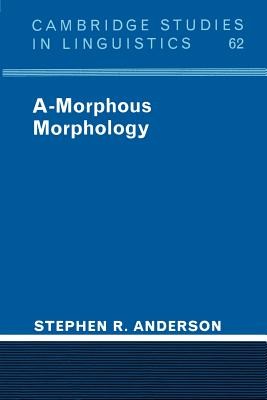
- We will send in 10–14 business days.
- Author: Stephen R Anderson
- Publisher: Cambridge University Press
- ISBN-10: 0521378664
- ISBN-13: 9780521378666
- Format: 15.1 x 23.1 x 2.7 cm, softcover
- Language: English
- SAVE -10% with code: EXTRA
Reviews
Description
A-Morphous Morphology presents a new theory of the structure of words, as it relates to a full generative grammar of language. It rejects the notion that complex words are built up by concatenating simple minimal signs or morphemes, and proposes instead that word structure is described by a system of rule-governed relations between one word and another. In his book, eminent linguist Stephen Anderson offers a discussion of the implications of his own original position for issues in language change, language typology and the computational analysis of word structure.
EXTRA 10 % discount with code: EXTRA
The promotion ends in 19d.15:49:52
The discount code is valid when purchasing from 10 €. Discounts do not stack.
- Author: Stephen R Anderson
- Publisher: Cambridge University Press
- ISBN-10: 0521378664
- ISBN-13: 9780521378666
- Format: 15.1 x 23.1 x 2.7 cm, softcover
- Language: English English
A-Morphous Morphology presents a new theory of the structure of words, as it relates to a full generative grammar of language. It rejects the notion that complex words are built up by concatenating simple minimal signs or morphemes, and proposes instead that word structure is described by a system of rule-governed relations between one word and another. In his book, eminent linguist Stephen Anderson offers a discussion of the implications of his own original position for issues in language change, language typology and the computational analysis of word structure.


Reviews